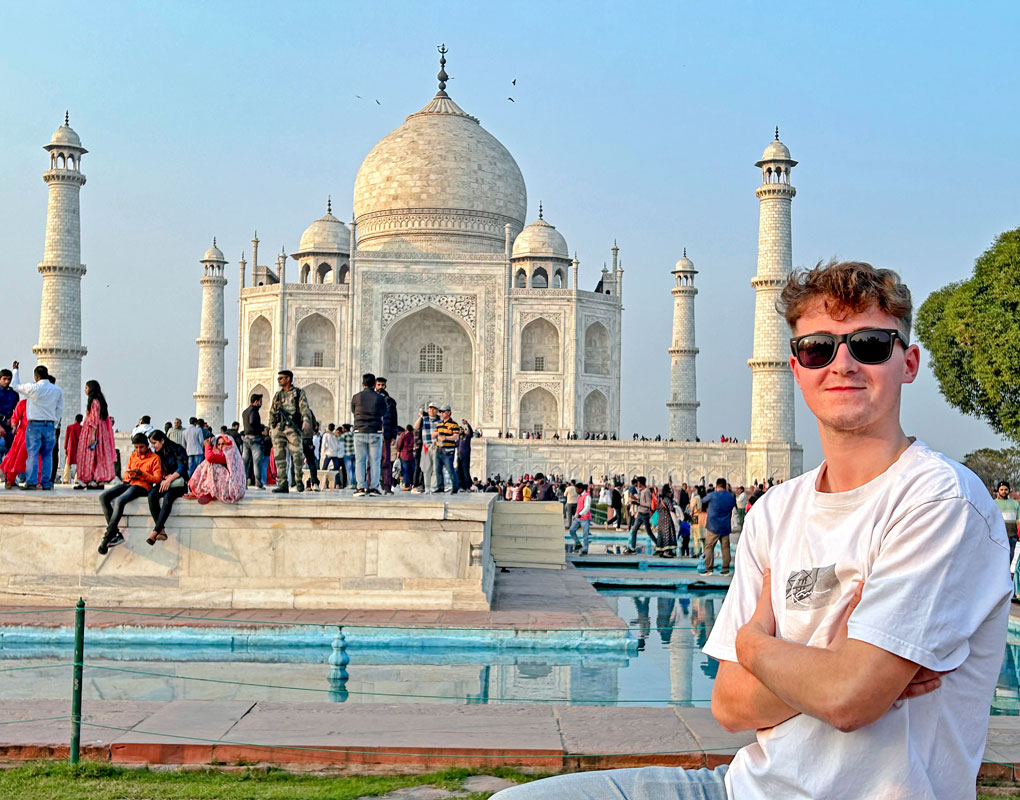
I simply loved Kerala and can tell you that no available tourist literature captures the entire beauty of Kerala,” gushes Henry Clemens, 18, a Rotary Youth Exchange (RYE) student from North Rhine-Westphalia, Germany, now in India on an RYE programme of RI District 3132. He is living with the family of Abhay Raje Jain from RC Ahmednagar Dignity, “but my host club is RC Ahmednagar Midtown.”
He is one in a group of eight other youth exchange students, seven from Latin America and one from France. “We have been travelling to a few cities such as Mumbai, Goa, and places in Kerala. I have to admit that I found Kerala so beautiful, that in the future when I think about India, Kerala’s unique beauty will pop up in my mind. Honestly, in Kerala, I could not distinguish whether we were in India or the Caribbean. I also thought unlike other places, pollution wasn’t a problem in Kerala. I like Goa too and Mumbai, but frankly I preferred Pune to Mumbai.”
So Mumbai did not dazzle him as it does other youngsters of his age, I prod Henry. “No, no, I liked Mumbai, specially the Marine Drive, which was such a beautiful sight. But it was too crowded for my taste; I really like Pune because it offered everything that Mumbai offers. I would say there is nothing in Mumbai that you can’t get in Pune. Of course it’s not as big as Mumbai, where I travelled in trains which were rather crowded, but it was really worth an experience to cherish! Pune is quieter and more relaxed, and I really liked it.”
Henry, whose father is the mayor of the town he lives in, finished his school education last year and learnt about the Rotary exchange programme when “our school principal, who is a member of the local Rotary club in Germany, wrote an email to the students graduating from the school about this opportunity. As he was also my math teacher,I was closer to him, and he guided me how to apply for it, and I did that as my college was starting only in mid-2024.”
He was selected and arrived in India in October 2023 and has travelled with other exchange students quite a bit in India. “I am enjoying my stay in India and am very fond of Indian food; my favourite dish is chicken malai tikka. I am a non-vegetarian but also like misal pav, paav bhaji and of course tandoori chicken as well as tandoori paneer.” He admits that in Germany he was used to consuming a lot more non-vegetarian food but has got used to the three totally vegetarian food days in a week that his host family in Ahmednagar, Maharashtra, observes.
Describing his daily routine, he says he starts with school (Class 12), returns home to relax for a bit, before “going out with my friends, often going to the ground to play football. When my host brother Kshitij, son of Abhay Jain, was here, we were roaming around the city, and went to the football ground and the boys there said I played rather well, so now I often join them,” he says.
This will be his routine, till he returns home this April. So what has he learnt about the way of life in India; its positives and negatives, I ask him.
“Well, I am learning about family life which is so different from the one in Germany; I find it very interesting to learn about the very different attitudes to so many things here, compared to Germany.” He gives the example of the attitude towards elders; “here people touch the feet of elders or bow down to them. In Germany, we respect all, but whether somebody is 10 or 70, it doesn’t really matter, and doesn’t make a big difference.”
On dust and pollution levels — to which he is getting used to and his “tolerance levels” are increasing — the exchange student says, “Things like burning garbage on the roads is something that is accepted here, but would really disturb people in Germany. I suppose it is the Indian way of thinking; my perception is that everyone takes things less seriously, and more calmly, even when it comes to somebody breaking traffic rules.”
Even when it comes to education… he is attending the commerce course in Class 12 in a school in Ahmednagar, this German youngster feels that “while marks and exams are taken much more seriously in India, in Germany, it is more about active participation in all activities, including extracurricular activities. Here the emphasis is more on book knowledge but there, classroom lessons account for only half the marks in the final grade. However, topics that are taught and discussed here and in Germany are very similar, such as maths, business studies, etc.”

On the RYE programme itself, RID 3132 DG Swati Herkal says, “This is a transformative gift to the youth worldwide, providing opportunities for cultural immersion, language learning, and personal growth. Through living overseas, participants build bridges of understanding, forge lifelong friendships, and become global citizens, contributing to a more peaceful and interconnected world.”
Giving the last word to Henry, I ask him if he will become a Rotarian after he graduates in business administration, the degree course he will join when he returns home later this year.
“Well, I’d like to join Rotary and become a Rotarian when I settle down and have a stable income of my own.”










